Rainbows, fog, heat on list of 13 weather-related phobias
2021: Teen struck by lightning still on road to recovery
A Texas teen was visiting Siesta Key Beach in 2020 with his family when he was struck by a bolt of lightning and became partially paralyzing. It’s been one year since then, and his family is hoping to educate beachgoers of the dangers of lightning.
The American Psychological Association defines a phobia, which is now called an anxiety disorder, as "a persistent and irrational fear of a specific situation, object or activity which is consequently either strenuously avoided or endured with marked distress."
People who have a fear of heights are acrophobic, while people who fear darkness are nyctophobic. Triskaidekaphobia is anxiety related to and the avoidance of the number 13. A fear that is specifically rooted in a Friday that falls on the 13th day of a month is called paraskevidekatriaphobia.
A Gallup poll found that 25% of Americans are very or somewhat superstitious of Friday the 13th, but a study published in the Bulletin of The American Meteorological Society found that the weather makes more Americans nervous than a date on the calendar – 85% of respondents said they had some degree of fear about severe weather and 40% said they had a moderate degree of fear.
Phobias related to nature and the environment are one of five subclassifications of fears outlined by the APA.
According to the APA, people are resilient and over time, sometimes with help, most can bounce back from weather-related trauma. People who suffer from these disorders can experience panic, rapid heartbeat, shortness of breath, trembling and a strong desire to get away wrote MentalHeatlh.gov.
ADVICE FOR DEALING WITH STORM ANXIETY WHEN SEVERE WEATHER THREATENS
Lilapsophobia
This is an unhealthy fear of tornadoes or hurricanes. The AMS study also showed that more than 40% of people had a fear of tornadoes and tropical storms. People who suffer from this phobia can live their lives like they are constantly under threat. Exposure therapy is a common treatment, according to the Cleveland Clinic.
Conquering this phobia led FOX Weather’s Kendall Smith to a career in meteorology. You can read more about her experience here.
Astraphobia
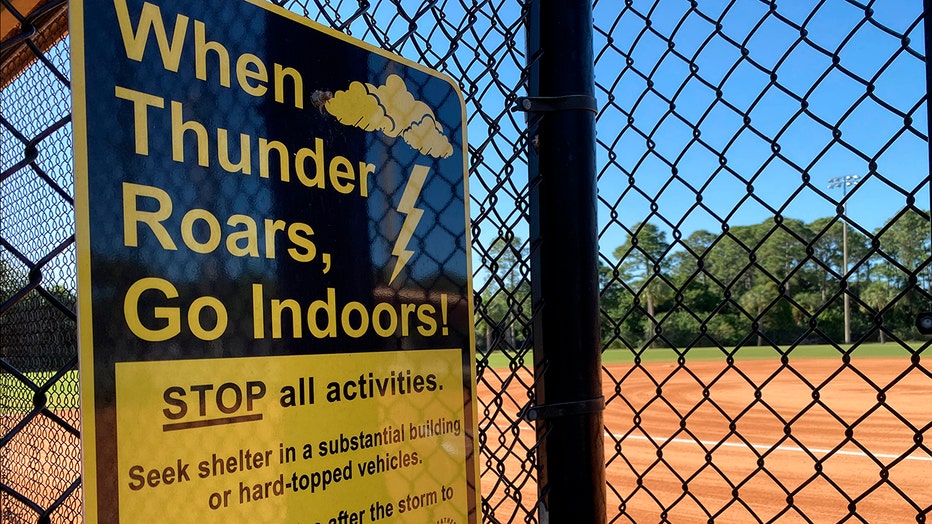
When thunder roars, indoors sign posted at baseball field, West Palm Beach, Florida. (Photo by: Lindsey Nicholson/UCG/Universal Images Group via Getty Images)
This is an unhealthy fear of thunder and lightning. More than 90% of AMS study respondents said they have suffered from astraphobia, and the Cleveland Clinic reported that it is one of the most common specific phobias.
Talk or exposure therapy and medication can help ease the symptoms. Meteorologists also suggest weather education to ease anxiety. Read more about how to deal with storm anxiety here.
Ancraphobia
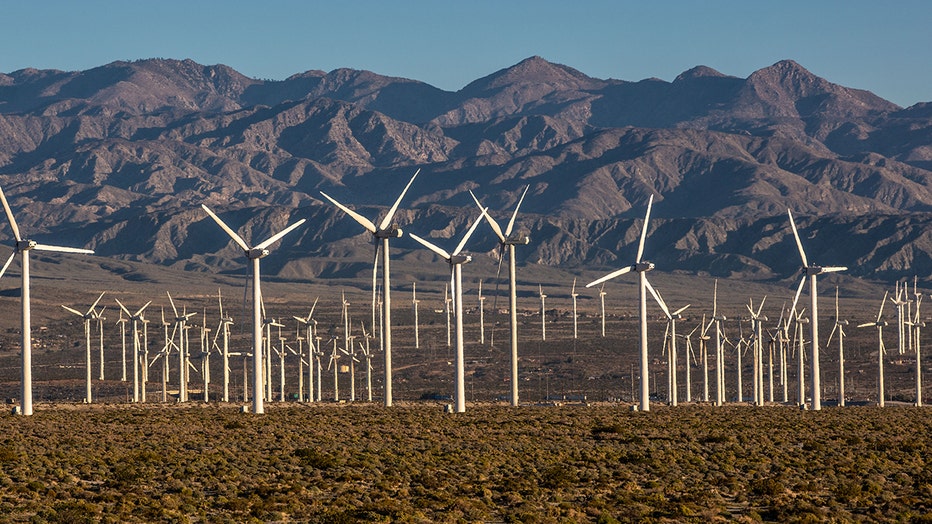
Hundreds of wind turbines are viewed along Highway 111 and Interstate 10 on March 7, 2022 near Palm Springs, California. (Photo by George Rose/Getty Images)
This is an unhealthy fear of wind and drafts. While 90% of people in the AMS study said they have feared high winds at some point, irrational fear of wind is quite rare.
Chinophobia
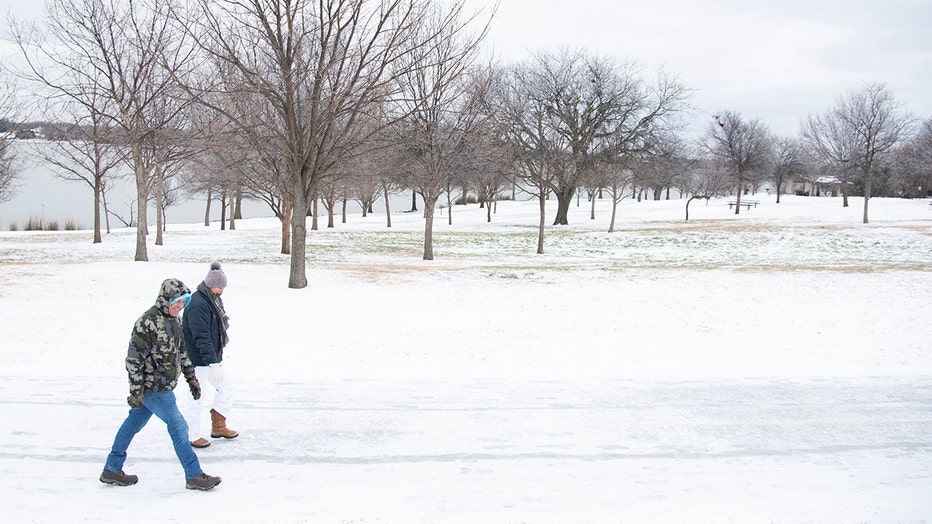
Jon and Lisa Whitten go for a walk in the snow at White Rock Lake after a winter storm in February 2022 in Dallas, Texas. (Photo by Emil Lippe/Getty Images)
This is an unhealthy fear of snow. Nearly 80% of respondents in the AMS study said they have feared heavy snow. Several people with this fear suffered snow-related trauma like losing someone to a car accident in the snow.
Ombrophobia
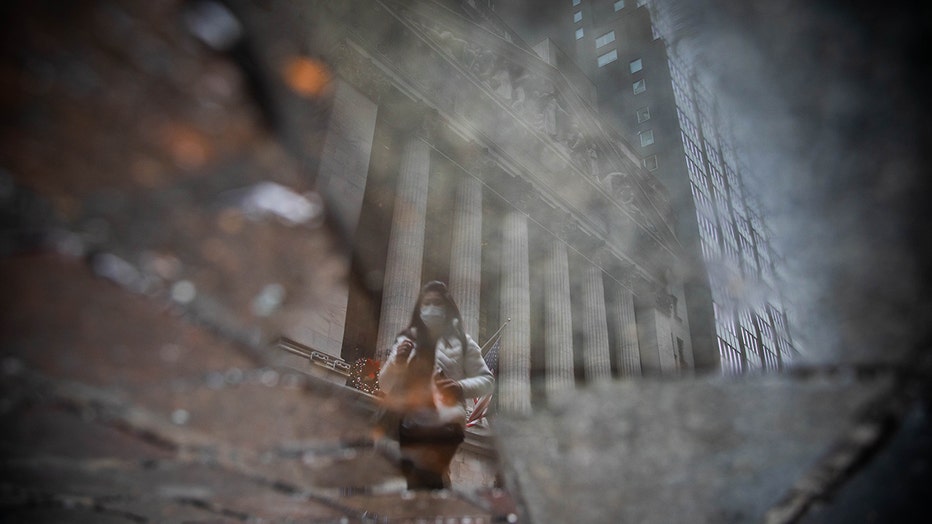
A pedestrian reflected in a puddle outside the New York Stock Exchange. Photographer: Michael Nagle/Bloomberg via Getty Images
This is a fear of rain, which includes heavy rain, acid rain, germs in rain and flooding rain, according to the Cleveland Clinic.
Other weather-related fears
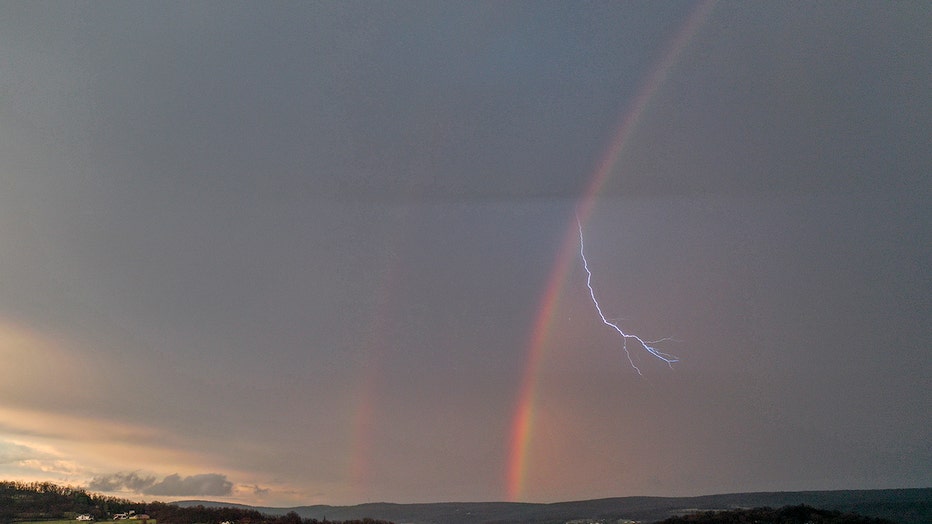
MYERSVILLE, MD - APRIL 31: A lightning strike appears through a rainbow after heavy thunderstorms on March 31, 2022 in Myersville, Md. (Photo by Ricky Carioti/The Washington Post via Getty Images)
- Pluviophobia – fear of weather related to rain and storms
- Antlophobia– fear of flooding
- Heliophoibia – fear of the sun
- Thermophobia – fear of heat
- Cryophobia – fear of cold, ice or frost
- Nephophobia – fear of clouds
- Homichlophobia – fear of fog
- Iridophobia – fear of rainbows
If you or someone you know suffers from these disorders, please seek the help of a medical professional or licensed therapist.
Follow updates on this story at foxweather.com.

